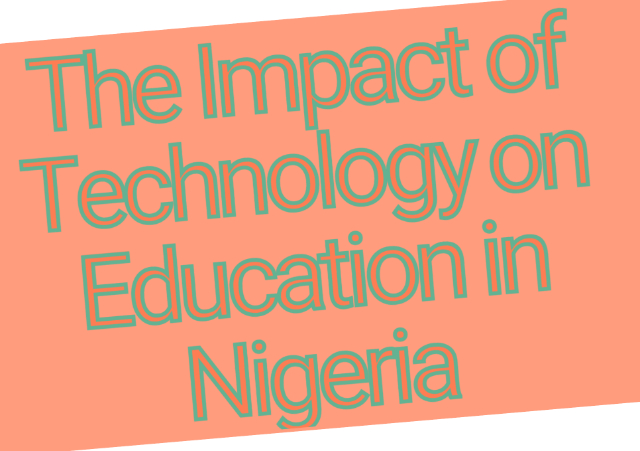
In recent years, technology has made a serious impact as long as education in Nigeria is concern.
It has also helped improve access to education, especially in rural areas where access to quality education can be limited.
Learning Online and all the platforms and educational resources have become increasingly popular because, it allows students to continue their education even outside of traditional classrooms.
Additionally, technology has also helped to improve the quality of education by providing students with more engaging and interactive learning experiences like their projects topic.
However, there are also challenges, such as the digital divide and limited access to technology for many students, which must be addressed to ensure that the benefits of technology in education are felt by all.
20 ways in which technology has helped education in Nigeria
- Increased access to education, especially in rural areas
- Availability of online learning platforms and educational resources
- Improved quality of education through interactive and engaging learning experiences
- Broader access to information and knowledge
- Greater efficiency in teaching and learning
- Improved communication between teachers and students
- Increased collaboration and teamwork among students
- Development of new teaching methods and approaches
- Enhanced assessment and evaluation of student learning
- Improved student motivation and engagement
- Increased accessibility for students with disabilities
- Greater opportunities for student-centered and personalized learning
- Improved preparation for the workforce and careers
- Better use of educational technology tools, such as laptops, tablets, and smartphones
- Increased affordability of educational resources
- Development of e-library systems for research and information access
- Better integration of technology into the curriculum
- Improved teacher training and professional development
- Greater transparency and accountability in the education sector
- Enhanced student skills and competencies in technology and digital literacy.
How Can Student Living In Rural Area Felt The Impact Of Technology In Education In Nigeria?
Students living in rural areas in Nigeria can feel the impact of technology in education in several ways:
- Improved access to educational resources: Rural students can now access online libraries, e-books, educational videos and other digital resources from the comfort of their homes.
- Virtual learning: Rural students can participate in online classes and virtual study groups, which have become an important alternative to traditional classroom-based education.
- Access to remote tutors: Technology has made it possible for rural students to receive one-on-one assistance from remote tutors, regardless of their location.
- Improved communication: Rural students can now easily communicate with teachers and classmates through online platforms, improving collaboration and the exchange of ideas.
- Improved examination system: Technology has helped to improve the examination system in Nigeria, with the introduction of online and computer-based assessments.
- Personalized learning: Rural students can now learn at their own pace and receive personalized feedback on their progress through technology-based learning systems.
- Career opportunities: Rural students can now explore and pursue a wider range of careers through online courses and certification programs.
- Access to current information: Rural students can stay up-to-date with current information and events through the internet and other digital resources.
- E-commerce opportunities: Rural students can take advantage of e-commerce opportunities to start small businesses and sell their products online.
- Improved job prospects: Rural students can improve their job prospects by acquiring new skills through online courses and certification programs.
- Access to digital resources: Technology has expanded access to digital educational resources such as online courses, e-books, educational videos and virtual study groups, which are often inaccessible to rural students.
- Improved learning opportunities: With the use of technology, students can participate in online learning, have access to remote tutors, and access interactive educational materials, which can enhance their educational experience.
- Bridging the gap between rural and urban areas: Technology is bridging the gap between rural and urban areas, providing students in rural areas with the same opportunities and access to quality education as their urban counterparts.
Overall, technology has made education more accessible and inclusive for rural students in Nigeria, helping to bridge the educational divide and provide improved learning opportunities.
Leave a Reply